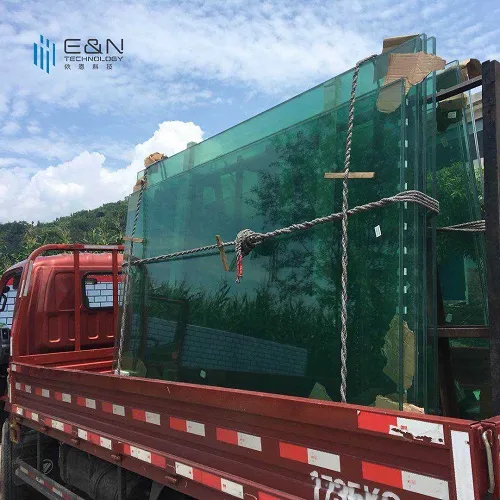Shatter proof glass, also known as safety glass, refers to a type of glass that is designed to resist shattering into dangerous shards when broken. This special glass is commonly used in various applications, such as automobile windows, building windows, and mobile devices. In this article, we will explore the concept of Shatter proof glass, its properties, and its effectiveness in preventing injuries.
Shatter proof glass is typically made by either laminating or tempering a standard glass material. Laminated glass is produced by sandwiching a layer of polyvinyl butyral (PVB) or ethylene-vinyl acetate (EVA) between two or more glass layers. The PVB or EVA layer acts as a bonding element, ensuring that the glass remains intact even when broken. Tempered glass, on the other hand, is created by heating the glass to a high temperature and then rapidly cooling it. This process creates internal tension, making the glass several times stronger than regular glass.
Shatter proof glass significantly reduces the risk of injuries that can occur due to broken glass. When shattered, laminated glass remains in place due to the interlayer, preventing glass shards from flying and causing harm. This is particularly crucial in automobiles and buildings, where shattered glass can pose a significant threat to occupants. Tempered glass, although it may break into small, relatively harmless pieces, is still considered a form of Shatter proof glass due to its ability to resist fragmentation into sharp shards.
It is important to note, however, that Shatter proof glass is not completely unbreakable. It is designed to resist shattering and reduce the risk of injuries, but it may still break under extreme force or impact. Additionally, while Shatter proof glass offers protection against shattered glass, it may not provide resistance against other forms of damage, such as scratching or cracking.

The use of Shatter proof glass is widespread across different industries. In the automotive industry, laminated glass is commonly used for windshields to prevent injuries in the event of an accident. This type of glass also improves the structural integrity of a vehicle's roof, reducing the risk of collapse during a rollover.
In the construction sector, Shatter proof glass is used for windows in high-rise buildings or areas prone to severe weather conditions. The ability of laminated glass to remain intact even after significant impact enhances the safety of occupants. Additionally, tempered glass is often employed for glass doors, shower enclosures, and glass balustrades due to its resistance to breakage and its ability to reduce the potential for injuries from sharp edges.
The demand for Shatter proof glass continues to grow as safety takes precedence in various industries. As technology advances, new materials and manufacturing processes are being developed to enhance the properties of Shatter proof glass further. Researchers are exploring the use of advanced polymers and coatings to strengthen glass's resistance to impact and improve its scratch resistance.
Moreover, with the increasing prevalence of mobile devices, there is a rising need for more durable screens. Companies are investing in the development of flexible and Shatter proof glass for smartphones and tablets, aiming to provide consumers with screens that are both aesthetically pleasing and highly resistant to damage.
Shatter proof glass is a crucial innovation that effectively reduces the risk of injuries caused by broken glass. Whether it is in the automotive industry, construction sector, or the development of mobile devices, the applications of Shatter proof glass are widespread and continuously evolving. While it may not be completely impervious to breakage, Shatter proof glass offers a significant improvement in safety and is likely to play an even more prominent role in the future.